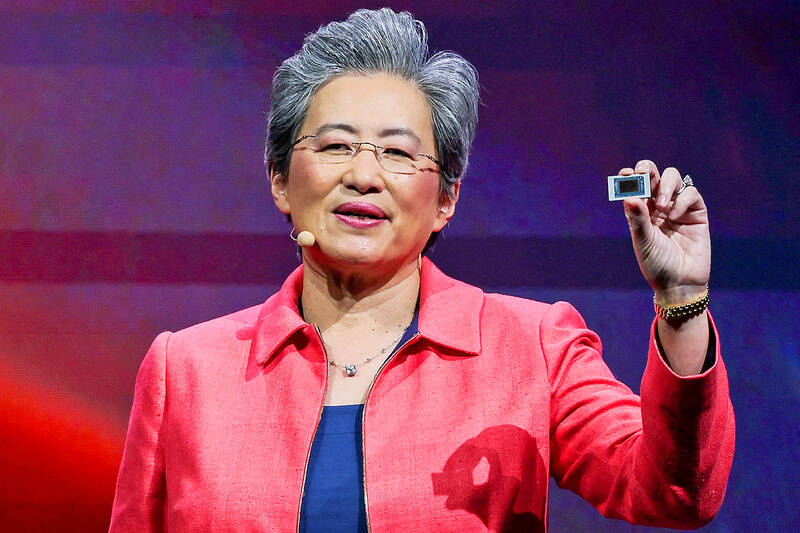Advanced Micro Devices Inc (AMD) suffered its biggest stock decline in more than a month after the company unveiled new artificial intelligence (AI) chips, but did not provide hoped-for information on customers or financial performance.
The stock slid 4 percent to US$164.18 on Thursday, the biggest single-day drop since Sept. 3. Shares of the company remain up 11 percent this year.
AMD has emerged as the biggest contender to Nvidia Corp in the lucrative market of AI processors. The company’s latest chips would exceed some capabilities of its rival, AMD chief executive officer Lisa Su (蘇姿丰) said at an event hosted by the company in San Francisco on Thursday,

Photo: Ann Wang, Reuters
Computer systems based on AMD’s MI325X processors would be available soon and have an edge over machines running Nvidia’s H100, she said, adding that the MI325X’s use of a new type of memory chip would give it better performance at running AI software — a process known as inference.
“This is an incredibly fast-growing market,” Su said during an interview with Bloomberg Television’s Ed Ludlow.
“We view this as a multiyear opportunity,” she added.
The Santa Clara, California-based company is trying to crack Nvidia’s dominance in so-called AI accelerators — chips that have become essential to the development of AI systems. Like Nvidia, AMD has committed to releasing new accelerators every year, stepping up its pace of innovation.
Under Su, the company has eclipsed its longtime rival Intel Corp in market valuation. However, both companies were caught off guard by how ferociously the industry embraced AI accelerators.
Of the two, AMD has responded far more quickly and established itself as the closest rival to Nvidia. AMD has set a target of US$4.5 billion of revenue from the new type of chips for this year, a rapid increase.
Su has said the overall market for such chips would hit US$400 billion in 2027. On Thursday, she said that the company expects that number to reach US$500 billion in 2028.
At the event, Su also said the company is releasing a new line of server processors based on its “Turin” technology, making a fresh push into a market once dominated by Intel.
Computers are going on sale with AMD’s fifth-generation EPYC central processing units, she said, adding that the chips have as many as 192 processor cores and can outperform the latest Intel products.
The company said that it now has 34 percent of the market for this category of chips when measured by revenue. Although Intel still dominates the segment, it once had a 99 percent share.
Su said that she expects continued growth in demand for AI and that the industry is still “just getting started” in its use of the new technology.
Separately, Su said AMD has no current plans to change the suppliers it uses for cutting-edge manufacturing. However, the company wants more geographical diversity in terms of its production, and is looking to work with Taiwan Semiconductor Manufacturing Co’s (台積電) new Arizona facility. Su refused to rule out using either Samsung Electronics Co or Intel in the future. She said AMD is keeping an open mind.
“We’re always looking at the manufacturing landscape and will always think about how we can have the most resilient supply chain,” she said.

Vincent Wei led fellow Singaporean farmers around an empty Malaysian plot, laying out plans for a greenhouse and rows of leafy vegetables. What he pitched was not just space for crops, but a lifeline for growers struggling to make ends meet in a city-state with high prices and little vacant land. The future agriculture hub is part of a joint special economic zone launched last year by the two neighbors, expected to cost US$123 million and produce 10,000 tonnes of fresh produce annually. It is attracting Singaporean farmers with promises of cheaper land, labor and energy just over the border.

US actor Matthew McConaughey has filed recordings of his image and voice with US patent authorities to protect them from unauthorized usage by artificial intelligence (AI) platforms, a representative said earlier this week. Several video clips and audio recordings were registered by the commercial arm of the Just Keep Livin’ Foundation, a non-profit created by the Oscar-winning actor and his wife, Camila, according to the US Patent and Trademark Office database. Many artists are increasingly concerned about the uncontrolled use of their image via generative AI since the rollout of ChatGPT and other AI-powered tools. Several US states have adopted

A proposed billionaires’ tax in California has ignited a political uproar in Silicon Valley, with tech titans threatening to leave the state while California Governor Gavin Newsom of the Democratic Party maneuvers to defeat a levy that he fears would lead to an exodus of wealth. A technology mecca, California has more billionaires than any other US state — a few hundred, by some estimates. About half its personal income tax revenue, a financial backbone in the nearly US$350 billion budget, comes from the top 1 percent of earners. A large healthcare union is attempting to place a proposal before

KEEPING UP: The acquisition of a cleanroom in Taiwan would enable Micron to increase production in a market where demand continues to outpace supply, a Micron official said Micron Technology Inc has signed a letter of intent to buy a fabrication site in Taiwan from Powerchip Semiconductor Manufacturing Corp (力積電) for US$1.8 billion to expand its production of memory chips. Micron would take control of the P5 site in Miaoli County’s Tongluo Township (銅鑼) and plans to ramp up DRAM production in phases after the transaction closes in the second quarter, the company said in a statement on Saturday. The acquisition includes an existing 12 inch fab cleanroom of 27,871m2 and would further position Micron to address growing global demand for memory solutions, the company said. Micron expects the transaction to